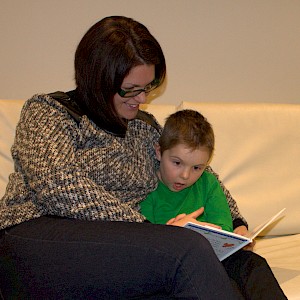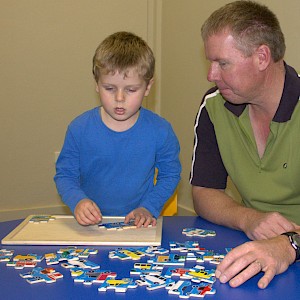Talking together with children at pre-school age is vital. At preschool age, rapid growth in speech and language skills occurs and sets the foundations of future learning, literacy, social skills and problem solving abilities.
Here are some of our top tips for talking with pre-schoolers:
- Talk together every day: Talk to your child whenever you can, as you go about daily activities like cooking, bathing, dressing, eating, travelling to kindy or school, getting ready for bed. Looking after children takes up a lot of time but this time can be used for learning and building relationships as you get the practical things done. It won’t take any extra time and if your child is involved in the conversation they will probably cooperate better too.
- Create a special talking time each day: This time can allow you to focus on talking with your child for a few uninterrupted minutes. You can do this with younger children by talking as you play or look at a book. Talk with older children about their day, to keep communication open and relationships developing.

- Get down to your child’s level: Ensure your child can see your face when you are talking to them. This can helps them to focus, visually watch and hear the words you are saying and encourages them to copy you. This might mean getting down on the floor, putting your child in your lap, cuddling up together on a couch or bed or sitting them up in a high chair at the table with you.
- Follow your child’s lead when you talk: Take some time to see what holds your child’s interests. You could do this by watching what they look at, touch, hear and reach for and talk with them about these things. Put out a range of toys or books and see which ones they choose. Watch what they do and copy them and talk about what they are doing.

- ‘Think out loud’: Talk about what you are doing in simple words as you do your daily activities to develop your child’s vocabulary and ability to label and name items, feelings and places. “I am cutting carrots into circles”. Think out loud as you make decisions to develop problem solving skills “I need to cut this; I will look for something sharp; a pair of scissors would be good”. Talk about how you feel to develop social and emotional skills. “I am feeling tired and a bit grumpy; I will sit down and have a rest and a nice cold glass of water to help me feel better”.
5. Be positive and encouraging: Remember to encourage your child at their communication attempts and praise them for good behaviour. Using specific words will help them to understand exactly what part was good, for example, “I like the way you used your words to ask for that”. “The red colour in that picture looks great”. You can also use specific language to tell your child what good things you would like them to do, “Sit here and draw a picture while I finish the dishes”. Ensure you link good behaviours with good, direct consequences, an example of this could be “Because you helped clean away the dishes, now we have time to go to the park”.
6. Model new words: Become more aware of things that your child may not have not seen before and teach them by talking about the new word. Teach them and label new action words when you do things together. Teach your child describing words by talking about what they see, hear, touch, taste and smell. This can include words about size, shape, colour and feel.
7. Recast your child’s errors: If your child makes a mistake when talking, conversational recasting involves repeating the sentence and fixing the mistake to model the correct way. Remember to use a positive tone and repeat it a few times in a natural way. This could look like, child ‘I runned’. Adult “Yes you ran, you ran very fast, you ran right to mummy’. Repeating the same word a few more times later on, will give your child plenty of chances to hear it the spoken in the correct way.
8. Use lots of repetition: Young children learn through repetition. This can look like repeating new ideas, words, concepts, stories and songs. Repeat new words and ideas in different places, times and situations to help your child learn the full meaning and understand different ways the word can be used.
9. Read lots of books together: Reading to your child is one of the best things you can do to help them learn. Make it a part of your day every day. Read new books but also old repeat old favourites. Choose books which suit your child’s age, language level and interests. Talk about what you read and ask your child questions.
10. Embrace new experiences. Try new places, games, songs, books and activities with your child. Do something special and different every chance you can as this opens up new words, ideas and concepts to talk about. Consider planning ahead if you are going somewhere. If you need to pick up that parcel there could be a playground to visit nearby. If you are shopping is there a new food your child might like to try. Consider taking photos of your child doing new things to talk about these later.
If you are concerned about your child's development including speech, language, play skills, social communication skills, social skills or learning check our website to see how Talking Matters may be able to help. For more ideas and resources check the resources section on our website and our extensive Pinterest page. Like us on Facebook and follow us on Twitter so you don't miss out on what's happening. If you'd like to talk to someone on our team about areas of concern please don't hesitate to get in touch.
Related Blog Posts
If you liked this post you may also like:
Follow Our Socials for MORE Ideas
Outdoor learning 101
Games for Travelling
Home practice



